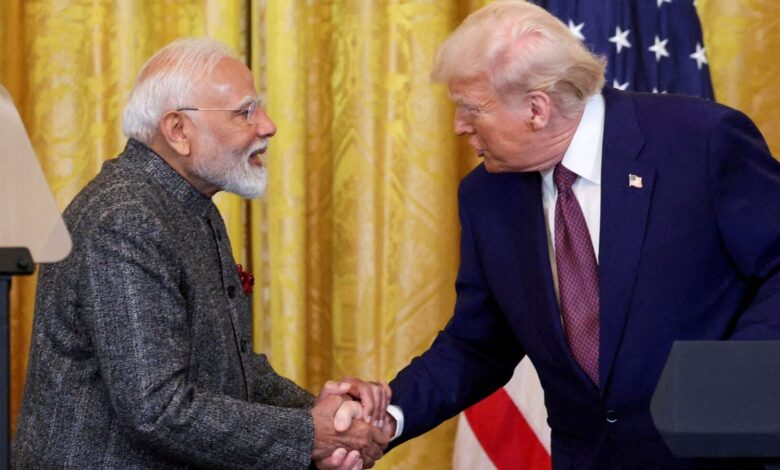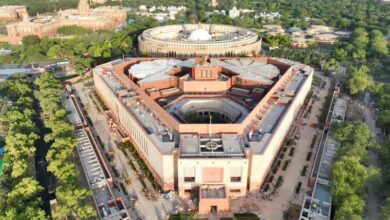India-US interim trade deal: New Delhi draws red lines as Trump’s deadline approaches, says ball in Washington’s court

With India setting its red lines on key issues in sectors such as agriculture and dairy for the proposed interim trade agreement with the US, the ball is now in Washington’s court to finalise the deal, sources said.
They said if issues are settled, an interim trade pact could be announced before July 9, which marks the end of the 90-day suspension period of the Trump tariffs announced on April 2 on dozens of countries, including India.
“India has drawn its red lines… now the ball is in the US court,” a PTI report quoted sources as saying.
India-US bilateral trade agreement
The two countries announced in February that they will be starting negotiations for a bilateral trade agreement (BTA) by September-October this year. However, before that, India and US are locking to finalise the interim trade pact.
On April 2, the US imposed an additional 26 per cent reciprocal tariff on Indian goods but suspended it for 90 days. However, the 10 per cent baseline tariff imposed by America remains in place. India is seeking full exemption from this 26 per cent tariff.
“If the proposed trade talks fail, the 26 per cent tariffs will come into force again,” one of the sources said.
Commerce Minister Piyush Goyal last week stated that India does not enter into any trade agreement based on deadlines and will accept the proposed trade deal with the US only when it is fully finalised, properly concluded and in the national interest.
Free Trade Agreements (FTA) are possible only when both sides get benefitted and it should be a win-win agreement, he said.
“National interest should always be supreme. Keeping that in mind, if a deal is made then India is always ready to deal with developed countries,” Goyal said on July 4.
India-US interim trade pact
The Indian team returned from Washington last week after holding talks with the US on an interim trade pact. Differences are also there on steel, aluminium (50 per cent) and auto (25 per cent) tariffs.
India has hardened its position on giving duty concessions to the US on agriculture and dairy products as both are sensitive subjects. India has never opened the dairy sector in any of the previous trade pacts signed.
US President Donald Trump last week said his administration is sending letters to the first batch of 10-12 countries, sharing details of reciprocal tariff rates and the entire process could be completed by July 9.
His comments came amid increasing suspense in India on whether New Delhi and Washington would be able to firm up a much-anticipated trade deal before the US president’s tariff deadline ends. He has, however, not named the countries.
The president has stated that the reciprocal tariffs would come into effect from August 1.
While the US is looking at duty concessions in sectors like certain industrial goods, automobiles (electric vehicles particularly), wines, petrochemical products, dairy, and agriculture items such as apples, tree nuts, and alfalfa hay; India may look at duty cuts for labour-intensive sectors like apparels, textiles, gems and jewellery, leather, plastics, chemicals, oil seeds, shrimp, and horticulture products.
US tariffs to kick in Aug 1 barring trade deals
US tariffs will kick in on August 1 if trading partners from Taiwan to the European Union do not strike deals with Washington, Treasury Secretary Scott Bessent said Sunday.
The rates will “boomerang back” to the sometimes very high levels which President Trump had announced on April 2 – before he suspended the levies to allow for trade talks and set a July 9 deadline for agreement, Bessent told CNN.
According to an AFP report, Bessent confirmed comments by Trump to reporters aboard Air Force One on Friday in which he also cited a new deadline: “Well, I’ll probably start them on August 1. Well, that’s pretty early. Right?”
The tariffs were part of a broader announcement in April where Trump imposed a 10 per cent duty on goods from almost all trading partners, with a plan to step up these rates for a select group within days. But he swiftly paused the hikes until July 9, allowing for trade talks to take place.
Countries have been pushing to strike deals that would help them avoid these elevated duties.
So far, the Trump administration has unveiled deals with the United Kingdom and Vietnam, while Washington and Beijing agreed to temporarily lower staggeringly high levies on each other’s products.
Bessent said the administration was “close to several deals.”
“I would expect to see several big announcements over the next couple of days,” he said.
But he would not say which countries he was referring to, adding: “I don’t want to let them off the hook.”
(With inputs from agencies)






